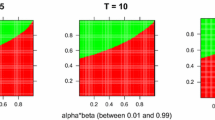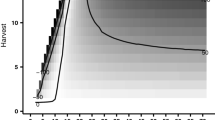Abstract
This paper examines how non-binding cooperative agreements on fisheries management can be sustained when the management plans in participating countries are implemented imperfectly, and compares the effects of implementation uncertainty and of recruitment uncertainty on the potential for cooperation. The model developed assumes two countries that share a fish stock. Reproduction depends on how much fish each country leaves behind after harvesting and hence on random variation in each country’s achieved abandonment level. A self-enforcing agreement is proposed that accounts for the random variation. The agreement is illustrated with a numerical example. A self-enforcing cooperative solution can only be sustained when uncertainty is not pronounced and when the two countries control close to equal shares of the fishery. Even when a cooperative agreement can be achieved, frequent phases of reversion to non-cooperative harvest levels are needed to support the agreement. A comparison of the effects of recruitment and implementation uncertainty on implicit cooperation indicates that implementation uncertainty is more likely to hamper cooperation.
Similar content being viewed by others
References
Bray, K. (2001), ‘A global review of illegal, unreported and unregulated fishing’, in Report of and Papers Presented at the Expert Consultation on Illegal, Unreported and Unregulated Fishing, FAO Fisheries Report No. 666, Rome: FAO
C. W. Clark G. P. Kirkwood (1986) ArticleTitle‘On uncertain renewable resource stocks: optimal harvest policies and the value of stock surveys’ Journal of Environmental Economics and Management 13 235–244 Occurrence Handle10.1016/0095-0696(86)90024-0
E. Green R. Porter (1984) ArticleTitle‘Noncooperative collusion under imperfect price information’ Econometrica 52 87–100
M. H. Groot ParticleDe (1986) Probability and Statistics EditionNumber2 Addison-Wesley Reading, MA
R. P. Hämäläinen V. Kaitala A. Haurie (1984) ArticleTitle‘Bargaining on whales: a differential game model with pareto optimal equilibria’ Operations Research Letters 3 5–11 Occurrence Handle10.1016/0167-6377(84)90064-6
R. Hannesson (1995) ArticleTitle‘Sequential fishing: cooperative and non-cooperative equilibria’ Natural Resource Modeling 9 51–59
R. Hannesson (1997) ArticleTitle‘Fishing as a supergame’ Journal of Environmental Economics and Management 32 309–322 Occurrence Handle10.1006/jeem.1997.0971
V. Kaitala M. Pohjola (1988) ArticleTitle‘Optimal recovery of a shared resource stock: a differential game model with efficient memory equilibria’ Natural Resource Modeling 3 91–119
Laukkanen M. (2003), ‘Cooperative and Non-cooperative Harvesting in a Stochastic Sequential Fishery’, Journal of Environmental Economics Management, 45(2), Supplement 1
Leschine, T. M. (1988), Policy analysis and the incorporation of biological objectives into fisheries management decisions, in W. S. Wooster, ed., Fishery science and management: objectives and limitations, Berlin: Springer.
R. McKelvey (1997) ArticleTitle‘Game-theoretic insights into the international management of fisheries’ Natural Resource Modeling 10 129–171
R. Nowak (1992) ArticleTitle‘Scotia-Fundy herring purse seine fishery: some economic considerations’ Marine Policy 16 183–196 Occurrence Handle10.1016/0308-597X(92)90080-9
R. G. Peyton (1987) ArticleTitle‘Mechanisms affecting public acceptance of resource management policies and strategies’ Canadian Journal of Fisheries and Aquatic Sciences 44 IssueIDSupplement 2 306–312
W. J. Reed (1978) ArticleTitle‘The steady state of a stochastic harvesting model’ Mathematical Biosciences 41 273–307 Occurrence Handle10.1016/0025-5564(78)90041-X
W. J. Reed (1979) ArticleTitle‘Optimal escapement levels in stochastic and deterministic harvesting models’ Journal of Environmental Economics and Management 6 350–363 Occurrence Handle10.1016/0095-0696(79)90014-7
J. C. Rice L. J. Richards (1996) ArticleTitle‘A framework for reducing implementation uncertainty in fisheries management’ North American Journal of Fisheries Management 16 488–494 Occurrence Handle10.1577/1548-8675(1996)016<0488:AFFRIU>2.3.CO;2
A. A. Rosenberg S. Brault (1993) ArticleTitle‘Choosing a management strategy for stock rebuilding when control is uncertain’ Canadian Special Publication of Fisheries and Aquatic Sciences 120 243–249
Sethi, G., C. Costello, A. Fisher, M. Hanemann and L. Karp (2005), `Fishery Management under Multiple Uncertainty'. J. Environ. Econom. Management, in press, available online 5 March
J. Vislie (1987) ArticleTitle‘On the optimal management of transboundary renewable resources: A comment on Munro‘s paper’ Canadian Journal of Economics 20 870–875
G. N. White P. Mace (1988) ArticleTitle‘Models for cooperation and conspiracy in fisheries: changing the rules of the game‘ Natural Resource Modeling 2 499–530
Author information
Authors and Affiliations
Corresponding author
Rights and permissions
About this article
Cite this article
Laukkanen, M. Cooperation in a Stochastic Transboundary Fishery: The Effects of Implementation Uncertainty Versus Recruitment Uncertainty. Environ Resource Econ 32, 389–405 (2005). https://doi.org/10.1007/s10640-005-6542-0
Accepted:
Issue Date:
DOI: https://doi.org/10.1007/s10640-005-6542-0




